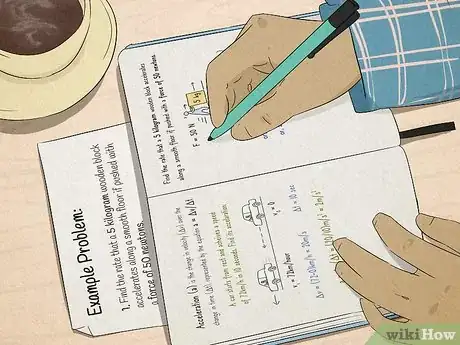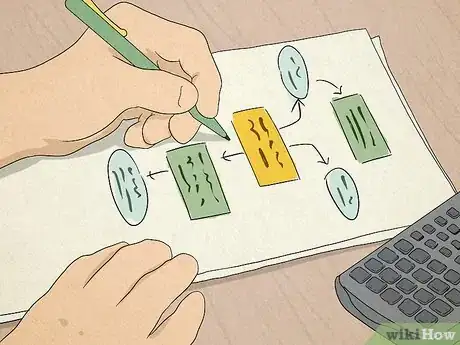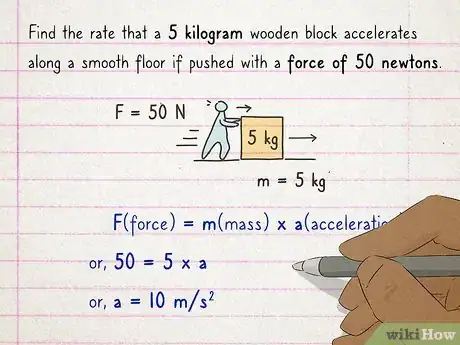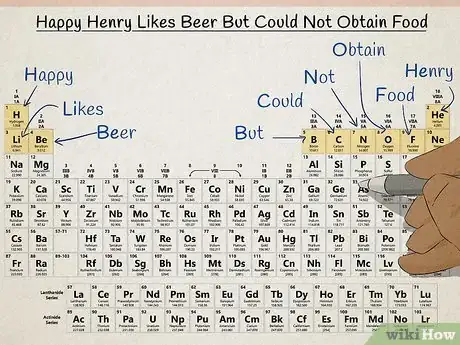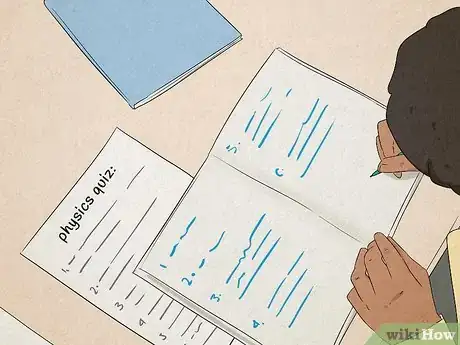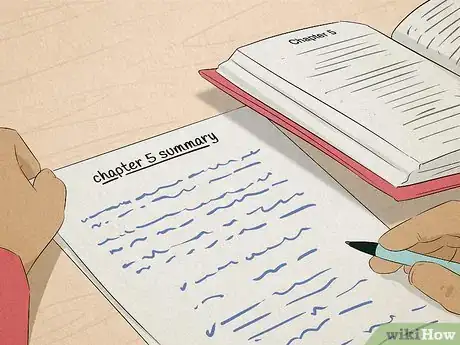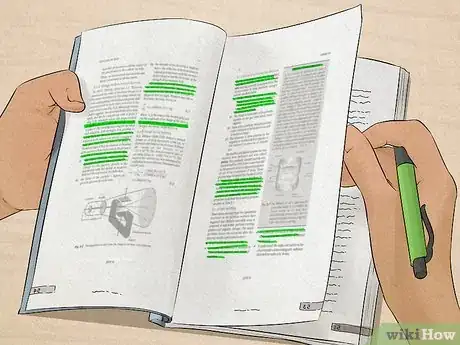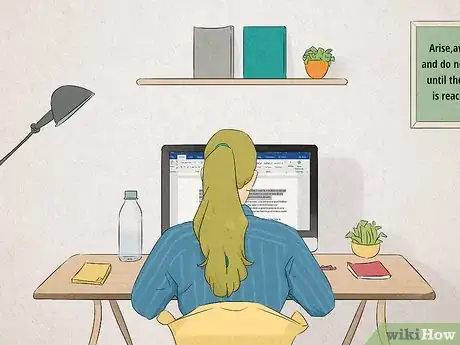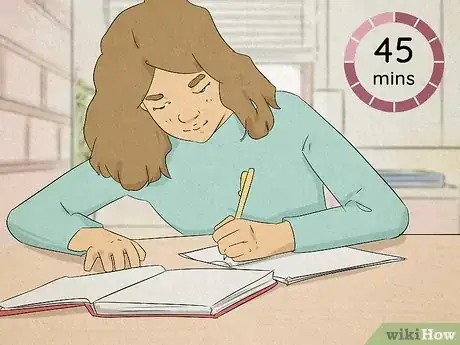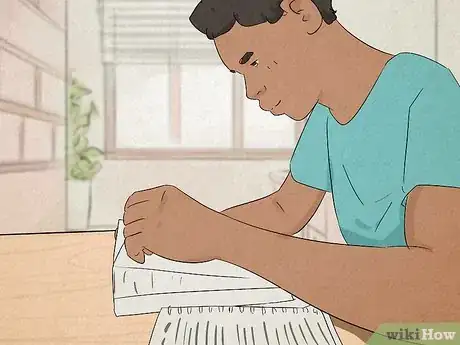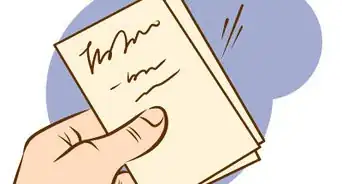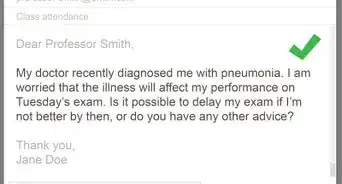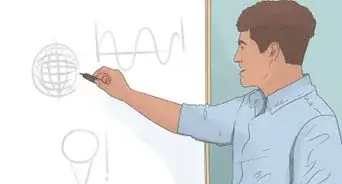This article was co-authored by Jai Flicker and by wikiHow staff writer, Hunter Rising. Jai Flicker is an Academic Tutor and the CEO and Founder of Lifeworks Learning Center, a San Francisco Bay Area-based business focused on providing tutoring, parental support, test preparation, college essay writing help, and psychoeducational evaluations to help students transform their attitude toward learning. Jai has over 20 years of experience in the education management industry. He holds a BA in Philosophy from the University of California, San Diego.
There are 9 references cited in this article, which can be found at the bottom of the page.
wikiHow marks an article as reader-approved once it receives enough positive feedback. This article received 39 testimonials and 85% of readers who voted found it helpful, earning it our reader-approved status.
This article has been viewed 249,476 times.
It can be a little nerve-wracking when your science teacher announces an exam since you may have to remember formulas, vocabulary, and lab problems. Even though science might seem like a tricky subject to learn, there are a lot of things you can do to remember what you learned in class. We’ll start with some basic guidelines for studying efficiently and then cover techniques you can use to review and memorize everything you need to know!
Steps
Expert Q&A
Did you know you can get expert answers for this article?
Unlock expert answers by supporting wikiHow
-
QuestionWhat is the best method to study effectively?
 Jai FlickerJai Flicker is an Academic Tutor and the CEO and Founder of Lifeworks Learning Center, a San Francisco Bay Area-based business focused on providing tutoring, parental support, test preparation, college essay writing help, and psychoeducational evaluations to help students transform their attitude toward learning. Jai has over 20 years of experience in the education management industry. He holds a BA in Philosophy from the University of California, San Diego.
Jai FlickerJai Flicker is an Academic Tutor and the CEO and Founder of Lifeworks Learning Center, a San Francisco Bay Area-based business focused on providing tutoring, parental support, test preparation, college essay writing help, and psychoeducational evaluations to help students transform their attitude toward learning. Jai has over 20 years of experience in the education management industry. He holds a BA in Philosophy from the University of California, San Diego.
Academic Tutor Find the best learning approaches for you specifically. For example, a very common practice is creating flashcards. Some people jump to it and love the idea of flashcards as a practical study tool. Others may resist flashcards. Use studying as a self-knowledge exercise to see what actually works and what doesn't. It's all a lesson in what works for you.
Find the best learning approaches for you specifically. For example, a very common practice is creating flashcards. Some people jump to it and love the idea of flashcards as a practical study tool. Others may resist flashcards. Use studying as a self-knowledge exercise to see what actually works and what doesn't. It's all a lesson in what works for you. -
QuestionHow do you set a study schedule?
 Jai FlickerJai Flicker is an Academic Tutor and the CEO and Founder of Lifeworks Learning Center, a San Francisco Bay Area-based business focused on providing tutoring, parental support, test preparation, college essay writing help, and psychoeducational evaluations to help students transform their attitude toward learning. Jai has over 20 years of experience in the education management industry. He holds a BA in Philosophy from the University of California, San Diego.
Jai FlickerJai Flicker is an Academic Tutor and the CEO and Founder of Lifeworks Learning Center, a San Francisco Bay Area-based business focused on providing tutoring, parental support, test preparation, college essay writing help, and psychoeducational evaluations to help students transform their attitude toward learning. Jai has over 20 years of experience in the education management industry. He holds a BA in Philosophy from the University of California, San Diego.
Academic Tutor Find a schedule that works for you as an individual. Some people really need their sleep and may do better with a late start when studying. Others love getting up early, so they're going to do better with an early start to get all of their studying out of the way. Create a schedule that fits your temperament.
Find a schedule that works for you as an individual. Some people really need their sleep and may do better with a late start when studying. Others love getting up early, so they're going to do better with an early start to get all of their studying out of the way. Create a schedule that fits your temperament. -
QuestionHow can I make remembering scientific definitions easier?
 Community AnswerTry writing them down and saying them. You can also make your own flash cards.
Community AnswerTry writing them down and saying them. You can also make your own flash cards.
Warnings
- Never cheat on an exam since you could get in academic trouble and you won’t actually learn the concepts.⧼thumbs_response⧽
- While it’s tempting to cram right before a test, you’re more likely to forget the information.⧼thumbs_response⧽
References
- ↑ https://www.jccmi.edu/science/how-to-study-science/
- ↑ https://www.usa.edu/blog/study-techniques/
- ↑ https://www.apa.org/ed/precollege/psychology-teacher-network/introductory-psychology/study-better
- ↑ https://www.usa.edu/blog/study-techniques/
- ↑ https://www.apa.org/ed/precollege/psychology-teacher-network/introductory-psychology/study-better
- ↑ https://www.jccmi.edu/science/how-to-study-science/
- ↑ https://legacy.webster.edu/academic-resource-center/how-to-study-effectively.html
- ↑ https://www.usa.edu/blog/study-techniques/
- ↑ Jai Flicker. Academic Tutor. Expert Interview. 20 May 2020.
- ↑ https://www.usa.edu/blog/study-techniques/
- ↑ Jai Flicker. Academic Tutor. Expert Interview. 20 May 2020.
- ↑ https://kidshealth.org/en/teens/test-terror.html
- ↑ https://www.jccmi.edu/science/how-to-study-science/
- ↑ https://entertolearn.byu.edu/how-organize-and-conduct-effective-study-groups
- ↑ https://students.dartmouth.edu/academic-skills/learning-resources/studying-stem/studying-sciences
- ↑ https://www.sciencemag.org/careers/2002/02/effective-study-strategies-will-help-you-ace-your-science-courses
- ↑ https://www.sciencemag.org/careers/2002/02/effective-study-strategies-will-help-you-ace-your-science-courses
- ↑ Jai Flicker. Academic Tutor. Expert Interview. 20 May 2020.
About This Article
To study for a science exam, start by finding a quiet study area without distractions. Next, set aside 1 hour work intervals, spending 45 minutes studying, then 15 minutes reviewing your work before taking a short break. When studying from your textbook, read the titles, introductory materials, and subheadings first for an overview of the chapters. Additionally, do any practice problems and highlight important vocabulary words. Then, use previous exams, study guides, and class lectures as a way to focus on your work. To learn how to take lecture notes that can easily be turned into study guides, keep reading!
